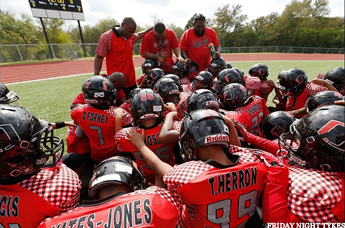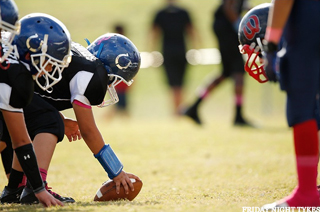In 1990, Buzz Bissinger introduced the world to the Permian Panthers with his book, "Friday Night Lights: A Town, a Team, and a Dream." In 2004 the film version, featuring Billy Bob Thornton, was released, and two years later, a fictional TV series helped turn Smash Williams, Tim Riggins and Matt Saracen into household names.
One thing that the book, movie and TV show all did was show just how big Texas high school football is. But the fervor for the game begins even earlier, and that's where "Friday Night Tykes" comes in. The Esquire Network show, which begins its second season Tuesday, dives into Texas youth football.
"This is real,"producer Matt Maranz says. "This is not a reality show. When you hear the term reality show, you think this is not real. This is a documentary. This is real life. Everything that is happening was happening before we got there."
"Friday Night Tykes" follows five youth football teams of 10- and 11-year-olds in the San Antonio area. Many of the teams feature players, coaches and parents from the first season, which documented the 9-year-old division.
In taping two seasons, Maranz finds the story of Texas youth football is not about the X's and O's on the field. It is not about the glaring fact the state produces some of the greatest players in the sport. It is about the spectators.
"While Friday Night Tykes is about youth football and youth sports, I really think it's most about parenting," Maranz says. "It's really about asking questions every parents asks. What should we let our kids do with youth sports? How far is too far?"

Friday Night Tykes follows the San Antonio Division of the Texas Youth Football Association, one of the higher levels of competition for youth football stars.
"If there was an NFL for 10-years-olds, some of these guys would be in the NFL and be stars," Maranz says.
One aspect of youth football, and to a larger degree youth sports, the show captures is the intensity of coaches. The first season proved witness to coaches scolding players and arguing with opposing coaches. This may all just be part of the sport.
"They come to our league in order to put their players through the highest pedigree," says Brian Morgan, CEO and president of the Texas Youth Football and Cheer Association. "I think they expect the coaches to get in your face."
Maranz and Morgan both admit the show garnered mixed reviews among casual viewers and those within the Texas Youth Football community. Youth sports can be a touchy subject. Some individuals enjoy seeing the inside aspects, while others are turned off by the coach-player relationship among youth teams. But Maranz does not think people can ignore the importance of youth sports.
"Youth football and specifically youth sports in general, it's a gigantic activity," Maranz says. "Outside of school, it's the largest extracurricular activity for children across America. There are millions of Americans kids playing youth sports. We're looking at youth sports. Is youth sports doing everything it's supposed to do?"
From a "Friday Night Tykes" perspective, it all circles back to the mothers and fathers of the players. From volunteer coaches to spectators, the parents are the individuals choosing to send their children out on youth fields and courts at varying levels. The program attempts to analyze the plight of parents from an objective perspective.
"There are some moments where adults create memories that kids will remember for a lifetime," Maranz says. "Then there are other points that make you think should these parents really be coaches. The focus is kind of shifting toward the parents. What we find really interesting is youth sports is an environment created for children, but it's created by the parents. Is youth sports really about the kids or is it really about the parents? I think we saw some things parents were doing that made us think who is this for? What is it really about?"
The balance between the good and bad influence of parents on youth sports is evident. "Friday Night Tykes" gives this idea a personal presence. The first season included examples of positive sportsmanship and athletic spirit that parents, for the most part, seek for their children.
"From my point of view, I think last year's episode when Coach Marecus [Goodloe] arranged with the coach from the other team for a kid with a disability to score a touchdown was a great moment," Morgan says. "I think it shows it's not all about hitting. It's about creating memories for a child for a lifetime."
In doing publicity for this season's premiere, Maranz and Morgan sat on a panel in New York City with ESPN's Jeremy Schaap and former NFL players Bart Scott and Tiki Barber.
"I talked to Bart, who is from Detroit, and he said that's just like how my coaches were, getting up in my face," Morgan says. "Tiki said where he played ball in Virginia, they didn’t have coaches like that, but he understands coaches act in different ways."
Added Maranz: "They hit the lottery when it came to football. Bart was from inner city Detroit. He's used to coaches yelling at him. Tiki came from more of a suburban background and I think he was taken aback by it more."

Morgan notes that while many of the players in the show will have their futures determined by puberty, high school coaches can be found mingling with parents and coaches, starting to recruit 10- and 11-year-olds to their elite programs. "Friday Night Tykes" hits on the process of developing football players at the youth level, before growth spurts and before children have the means of envisioning their long-term future. It is the parents who make the early decisions.
"I think we're showing one example of what youth sports can be," Maranz says. "It's an extreme example, but people get look for themselves."
The first of 10 episodes premieres Tuesday at 9 p.m. ET on Esquire Network.
-- Follow Jeffrey Eisenband on Twitter @JeffEisenband.





